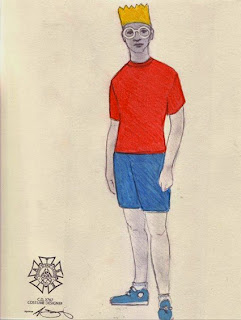A Simpsons Lover’s Guide to Mr. Burns, a post-electric play
By Adam Odsess-Rubin
 |
Costume designer Alex Jaeger’s
rendering of Bart Simpson
for A.C.T.’s production of
Mr. Burns
|
The heart of the show is the Simpsons family. Homer, the
father, is an irate buffoon who serves (poorly) as a safety inspector at Mr.
Burns’s nuclear power plant. Marge, the mother, is cautious and thoughtful, and
works hard to keep the family together. Lisa, the older daughter, is the moral
center of the show, a genius and die-hard liberal intellectual. Bart, the son,
is a sassy yellow Dennis the Menace, never found without the slingshot he uses
to terrorize his teachers. Lastly, Maggie is the silent baby, witness to the
family’s antics. Supporting characters, of which there are hundreds, include
Chief Wiggum, an inept donut-eating policeman; Abe Simpson, the forgetful
grandfather who loves to tell war stories from his past; and Mr. Burns, the
evil and greedy owner of a nuclear power plant who would rather block out the
sun than lose money.
Mr. Burns playwright Anne Washburn has pointed to the universal
appeal of The Simpsons as a major reason for its popularity, saying,
“The characters, when you think about them, are durable archetypes—Bart is a
Trickster; Homer the Holy Fool; Marge, I suppose, is a kind of long-suffering
Madonna; and then the inhabitants of Springfield are an almost endlessly rich
supply of human (and non-human) personalities.” But while the goofy family from
the fictional town of Springfield is undoubtably average, they and their fellow
townspeople are also undeniably unique. In large part, the show’s popularity is
due to the fact that it has always encouraged audiences to laugh at, and admit,
their own faults.
 |
| The Simpsons creator Matt Groening at the 2012 San Diego Comic-Con International. Photo by Gage Skidmore. |
The Simpsons
has always been visceral and immediate, even in its
earliest renderings as a series of crudely drawn skits for The Tracey
Ullman Show. The show has crafted episodes around immigration
(“Much Apu About Nothing,” 1996), gun rights (“The Cartridge Family,” 1997),
and the environment (“Trash of the Titans,” 1998). Given its penchant for being
current and politically relevant, the show has weathered a fair amount of
controversy. At the 1992 Republican National Convention, President George H. W.
Bush said, “We’re going to keep trying to strengthen the American family, to
make them more like the Waltons and less like the Simpsons.” In 1990, Barbara
Bush said the show was “the dumbest thing” she had ever seen. Of course, The
Simpsons retaliated with a parody—season seven’s “Two Bad Neighbors,” in which the first
family moves in across the street from the Simpsons.
With the ever-increasing popularity of
current-event satirists like Seth MacFarlane (Family Guy), Matt Stone
and Trey Parker (South Park, The Book of Mormon),
Jon Stewart (The Daily Show), and Stephen Colbert (The Colbert Report),
some critics believe it has been difficult for The Simpsons to
keep up in recent years. But it is impossible to deny the show’s influence.
Although critics complain that it can’t measure up to South Park and Family
Guy, these shows wouldn’t exist if it weren’t for the groundwork laid by
Groening almost 30 years ago. MacFarlane acknowledged this debt, saying, “The
Simpsons created an audience for primetime animation that had not been
there for many years. They basically reinvented the wheel.”
It is no coincidence that Washburn chose The
Simpsons as the sole surviving cultural artifact after the apocalypse. The
Simpsons has permeated all aspects of our culture, deconstructing
celebrities, fads, and trends by way of spoof, riff, and satire. Various Simpsons
episodes have tackled film classics from Psycho to A Clockwork Orange
(Hitchcock and Kubrick seem to be favorite targets) and plays from Macbeth
to Rent. The antagonist of “Cape Feare” and regular Simpsons
supporting character Sideshow Bob is a lover of theater. In “Cape Feare,” he
sings songs from the H.M.S. Pinafore and shows off his branded prison
number—24601, the same inmate number as Jean Valjean’s in Les Misérables.
The Simpsons has devoted entire episodes to spoofing Tennessee
Williams’s A Streetcar Named Desire (“A Streetcar Named Marge”) and
Andrew Lloyd Webber’s Evita (“The President Wore Pearls”).
Indeed, audiences find pleasure in deciphering the
treasure trove of obscure pop-culture nods sprinkled throughout episodes. The
potency of memory, storytelling, and one of our most iconic pop-culture staples
intersect in Mr. Burns, a post-electric play. As Washburn suggests, even
if a nuclear meltdown or global warming were to destroy civilization as we know
it, it’s likely that The Simpsons would, indeed, endure.
For more about Mr. Burns, be sure to read our latest edition of Words on Plays!
Click here to order online.
For tickets to Mr. Burns visit act-sf.org/burns.

